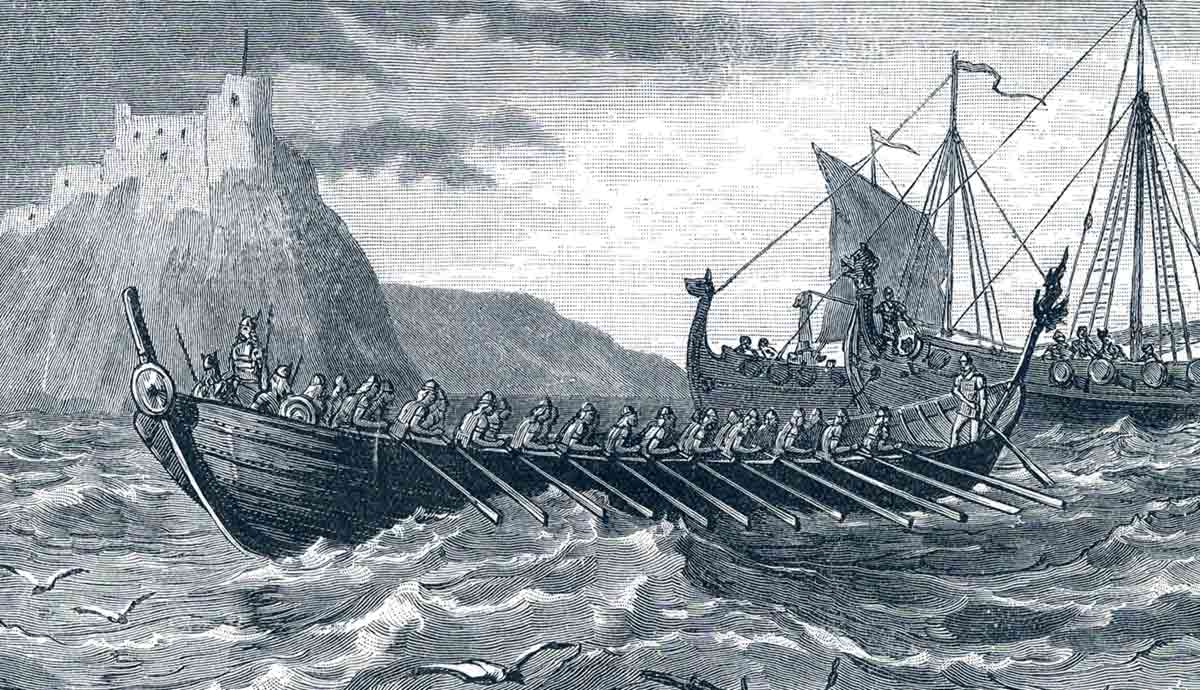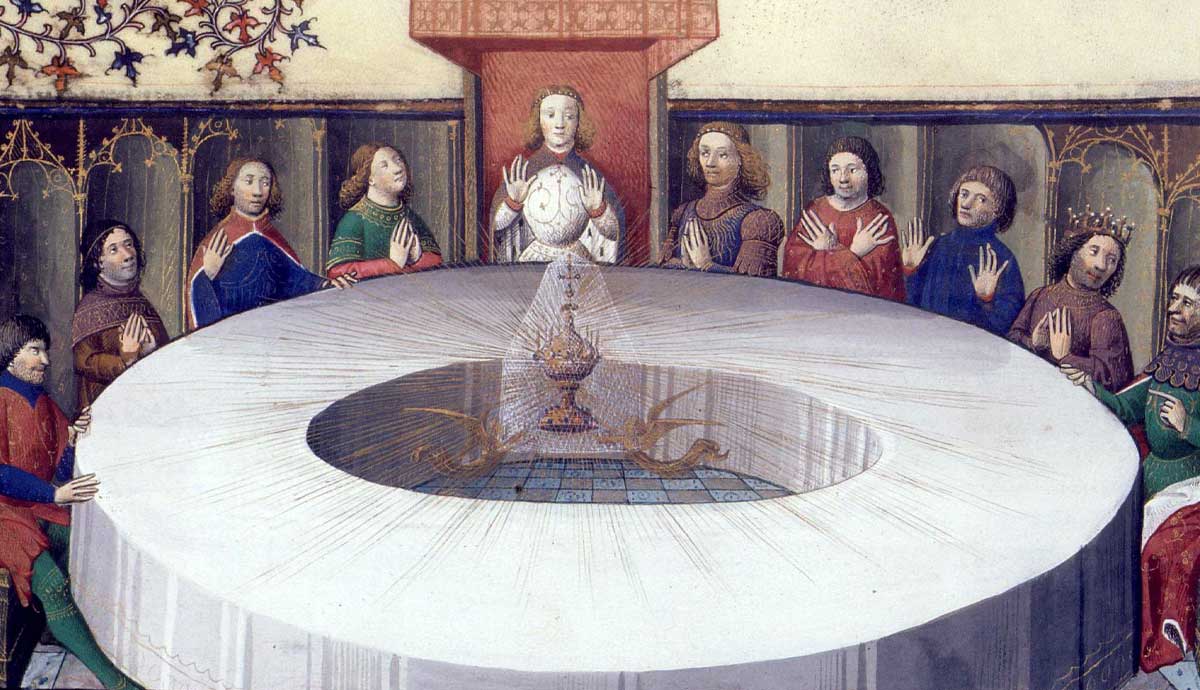
Richard I (1157-1199), the Lionheart, is celebrated as England’s great warrior king, a man who embodied the ideals of medieval chivalry and nobility. Historically, however, Richard was notorious for having had little interest in England or the English—and in truth, he was never supposed to rule England at all. Yet despite this, he is still beloved as an English national icon and one of the country’s most beloved rulers. How then did Richard become King, and why is he so beloved in a country he apparently cared little for?
Born to Rule, but Not in England

Richard’s re-appraisal as a very un-English king is already well known. All told, he only spent six months in England and spent almost all his reign abroad on Crusade and other ventures that nearly bankrupted the country. So how did such an un-English man become king of England? To understand that we must look back at his family and origins.
Born, interestingly enough, in Oxford, Richard was the third oldest child and second to survive infancy, of Henry II of England and Eleanor, Duchess of Aquitaine. His parents were the ultimate medieval power couple. Between them, they ruled over a vast dominion known as the Angevin Empire, which included England and much of modern-day France, Wales, Ireland, and Scotland. Richard’s father was an energetic and ambitious king, and his mother was a brilliant political operator and famous cultural patron.
Richard spent his early years between England and his parent’s French territories receiving a courtly education. Far from the military meathead as he is sometimes portrayed, Richard was a cultured prince who even wrote poetry, literacy being a notable gift at the time. He spoke both Court French and Occitan (his mother’s first language) but it is unknown if he ever spoke English.
Richard was groomed to be an ideal medieval ruler, but not of England, which was to be inherited by his older brother, Henry. Instead, Richard was to inherit his mother’s Duchy of Aquitaine. In other words, Richard was born not to be King of England but an Anglo-Norman French duke. By the late 1160s, Richard was immersed in the famous cultural court of his mother’s Aquitanian estates, his future seemingly pointed very much away from England.
Duke of Aquitaine

In 1167, Richard pledged homage as future Duke of Aquitaine to King Louis VII of France. In practice, Richard was of course subservient to his father, though Henry was technically also a vassal of Louis due to his French and Norman holdings. The complex legal framework of feudal vassalage aside, Richard was soon given more practical responsibilities.
In 1171 Henry II decided his sons should prepare for their succession. His first son was elevated to co-monarch, becoming known as “Henry the Young King” to ease confusion. Meanwhile, Richard was officially made Duke of Aquitaine at the tender age of 14. Although Eleanor still had a hand in governance, Richard undertook important duties while gaining ruling work experience.
However, in 1173 Henry the Young King rebelled against his father for taking the revenue earned by the Young King’s new positions for himself. Richard joined his brother, supported by their mother, who had all but legally separated from Henry II due to infidelity, alongside his Aquitanian vassals and with King Louis also providing support. Barely 15 years old, Richard was now a military commander in this family squabble-turned-international conflict.

Despite his youth, Richard showed an impressive aptitude for warfare, but in 1174 Henry II made a separate peace with Louis, and then captured Eleanor, forcing the brothers to capitulate. Their father forgave them but kept their mother in custody, to ensure continued compliance. Henry did, however, make one demand of his second son, ordering Richard to pacify the Aquitanian lords who were still in rebellion.
Whether or not Richard felt any qualms about betraying the subjects who had previously supported him, he still dutifully obeyed his father. Richard’s military reputation continued to grow as a tactician and warrior, and soon he gained his magnificent epithet: Cœur de Lion, or the Lionheart, for his bravery and skill.
However, Richard’s lack of enthusiasm led to a weak pacification policy of all sticks and no carrots. As a result, he faced repeated Aquitanian uprisings from 1175 to the early 1180s. He also faced threats from France’s new king Philippe II and even his brothers Henry and Geoffrey of Brittany, though his father did his best to mediate these conflicts.
Warrior Duke to Unintended Heir

Richard’s life was one of constant diplomatic, political, and military maneuvering as he struggled to assert himself in the violent world of the medieval elite. Yet he seemed more than up to the task and may well have become a powerful and respected French-Aquitanian Duke. Then, in 1183, the Young King died suddenly of typhus and Richard’s life, not to mention the fate of the Angevin Empire, was turned upside down.
Richard was now heir to the throne, with all the responsibilities that came with it. Though he had likely returned to England on occasion, his main focus had been on Aquitaine. He had spent his whole life so far learning to be a French duke but was now to become a king. The two certainly had transferable skills but a provincial vassal was on a very different level to being the sole ruler of a vast multinational dominion. Furthermore, to rebalance his empire, Henry II demanded Richard to hand over Aquitaine to his younger brother John. Richard refused to even consider it, even after Henry released Eleanor to negotiate the handover with him.
Some have seen Richard’s refusal as a sign that he would have preferred to keep Aquitaine than take the English crown. However, after spending all his life preparing to rule Aquitaine, and almost a decade fighting over it, Richard’s refusal is understandable. Strategically, it was also a vital asset and a strong powerbase for Richard, which his brother could use to challenge him in the future.

For four years, Richard stubbornly refused to give up Aquitaine, his defiance teetering dangerously close to open rebellion. In 1187, things escalated dramatically when Richard signed up for the newly called Third Crusade as penance for the brutality of his previous actions against his Aquitanian vassals. Henry II refused to let Richard risk his life in the Holy Land and moved from diplomatic pressure to outright force.
However, Richard was well-liked by Henry’s other vassals, and many sided with him, the worst betrayal being when John, Henry’s favorite son, took his brother’s side. Henry even went so far as to ask Philippe II of France to assist him. However, in a display of his budding political abilities, Richard managed to secure Philippe as his ally instead. In 1189, Richard and Philippe defeated Henry at the Battle of Ballans and two days later Henry died, it was claimed, of a broken heart.
Absent Ruler of an Empire

So that is how Richard, the second son of a king and destined all his life to be a French duke, suddenly found himself king of England. Or more accurately, ruler of the Angevin Empire. Though the king of England was his senior title, Richard’s dominion was far more than just England. Westminster may have been his capital, but Rouen, Chinon, Poitiers, and Limoges were all major centers of governance and administration.
So how did Richard fare as a ruler? Notoriously, barely a year after his coronation, Richard left his kingdom to go on Crusade, not exactly the most responsible action for a fledgling king. However, Richard had signed up for the Crusade before becoming king, and backing out would have been a terrible loss of face. Nor was he the only major European ruler to go, both Philippe of France and the Holy Roman Emperor Frederick Barbarossa had also taken the cross. In fact, going on Crusade was a powerful display of Richard’s power and his dominion’s prestige.
Yet Richard’s crusading venture had mixed results. Militarily, he won several victories and famously went toe-to-toe with the legendary Saladin. However, he fell out with Philippe and the Duke of Austria, who commanded the Holy Roman Empire’s contingent after Barbarossa died. As a result, they both abandoned the Crusade, forcing Richard to make peace with Saladin and give up on his dream of taking Jerusalem. Yet on return from the Crusade, things only got worse.

While heading home, in autumn 1193, Richard was blown off course and had to travel through Austria. However, he was recognized and kidnapped by the Duke of Austria, who then sold him to the new Holy Roman Emperor, Henry VI, who demanded a ransom of 150,000 marks, more than twice the annual royal revenue. After several months the money was finally raised through a one-off tax and Richard returned to his kingdom in early 1194—only to find it a total mess.
After hearing news of Richard’s capture, John made a bid for the throne, while a newly returned King Philippe attacked Richard’s French territory. Normandy and Anjou were in serious jeopardy, Aquitaine was again in rebellion and mercenaries in John’s pay had taken control of several parts of England. It was a small miracle that his mother and the administration ruling in Richard’s absence were even able to raise the funds to secure his release.
A Reign Cut Short

Richard returned to a financially drained and politically unstable kingdom. Thankfully on his triumphal return to England, John’s attempted coup collapsed almost immediately. After the last of his mercenary forces were scoured from their strongholds, Richard magnanimously forgave his brother. With England put to rights, Richard swiftly moved to France to deal with Philippe.
Richard managed to militarily and diplomatically outfox Philippe, forming a coalition of other powerful lords, such as the Duke of Flanders, to assist him as he defeated Philippe in a series of brilliant campaigns to retake his lost territory. Richard even found the time to design and construct the Château Gaillard, a state-of-the-art fortress that dominated the Seine Valley and controlled the frontier with France.
On the eve of the 12th century, Richard’s rejuvenated Angevin Empire was the undisputed great power of Western Europe. However, in March 1199, as Richard was besieging Château de Châlus-Chabrol, the home of yet another rebellious Aquitanian lord, he was hit in the shoulder by a speculative crossbow bolt from the castle walls. The wound became infected and three days later, Richard died in his mother’s arms. So, he passed at 42, his life cut short in its prime—but then again Richard, always the warrior king, had lived by the sword.

For most of his adult life, Richard had been engaged in business outside of England and famously he spent very little of his decade-long reign in England itself. Yet at the time of his death, he was a well-loved king and despite historiographical pushback, English infatuation with him has only grown. His motto Dieu et mon Droit (“God and my Right”) is still the motto of the Royal Family, and his coat of arms of three lions, a national symbol of England. Why does England love the king who shouldn’t have been? More pertinently, was he as great a king as popularly believed?
Historian Stephen Runciman described Richard as “a bad son… and a bad king, but a gallant and splendid soldier.” Yet there is much to be considered in appraising Richard’s actual rule.
The Glamor of the Warrior King

In one regard at least, the adoration of Richard is understandable—he was an astonishingly glamorous king. Richard was the avatar of medieval chivalry, embodying all the traits popularized by troubadours and romantic poets of the time. There are accounts critical of his behavior but many of these were sponsored by his enemies and even they often acknowledge Richard’s splendor. By most accounts, he was good-looking, eloquent, and a generous lord, though prone to thoughtlessness and vanity at times.
He was not only a brilliant general and warrior but was dedicated to his troops and often put himself in danger for their safety. While he did commit acts of brutality, they were not the exception for the time and by and large, Richard was famous for being courteous to his enemies on and off the field. Famously, he even forgave the arbalest who shot him while on his deathbed. Though Richard spent little time in England, his military glory, especially the Crusade, greatly boosted contemporary English prestige.

Regarding the little time he spent in England, it must be remembered that his domain included far more than just England. Richard’s absence from England does not mean an absence of kingly qualities. The fact is, however, Richard died without doing much actual ruling because wars, of his own creation or not, dominated his reign.
Yet, Richard’s military career and charisma do not mean he was a capable ruler. In his time as king, he spent the royal treasury rather than saved its coin, but the kingdom was prosperous enough to recover even from the extra taxes levied to pay his ransom, though many Church chroniclers criticized him fiercely for levying taxes on the Church to repay this debt. He was certainly not the great statesman and reformer his father had been. However, he was not a tyrant or political failure. He did sell offices of state to the highest bidder, but this was not a vice unique to Richard in this period and he was still able to create a capable government.
Kings, Contrasts, and Nostalgia for Better Days

Richard’s administration ruled very successfully during his absences and was dismantled by John before Richard returned and restored it again. This last part is perhaps the best indicator as to why Richard became so beloved after his death.
In contrast to Richard’s sanctified image as the paragon of kingly virtue, John, after he succeeded Richard, is remembered as arguably one of England’s worst kings. He was a tyrant who abused his subjects and financially and politically drove the Angevin Empire into the ground. Worst of all perhaps, John lost almost all his French territories—built up by his family over generations—in less than a decade.
Small wonder then, that Richard was so fondly remembered compared to what came after. The zenith of the Angevins was immediately replaced by its nadir. Richard may have just maintained the status quo as king after his father, but this was enough to make him bring more prestige and glory to England than John.

Yet it wasn’t just in terms of glory that John’s failures raised Richard. John’s tyranny and administrative incompetence make Richard seem the more just and noble king. It is not that Richard was even that truly just and moral a king, but he maintained a degree of civil harmony that his brother did not during his reign or in his rebellion. Indeed, the idea of Richard restoring justice to England over John’s tyranny would become a staple of English folklore after his death in the classic tale of Robin Hood.
In essence, Richard may not have been the best ruler, nor spent much time in England. Yet, his glamor and charisma, combined with the stability of his reign on a domestic level, is what made him loved in England. He was the last shining beacon of England’s high medieval Angevin glory before it fell apart. Had he lived longer, he might have become a great king residing in England, or he might not have—that question must be left to speculation.









